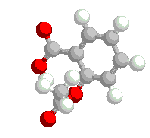The Secret Science Club Presents "Our Chemical Romance" on Wednesday, November 7 at 7:30 PM

WORLD-RENOWNED CHEMIST RONALD BRESLOW LECTURES ON SAHA
H2O, CO2, C6H12O6. All these molecules are naturally occurring—but new ones are being created all the time. “What I do is make new molecules with interesting properties,” says Columbia University chemist and professor Ronald Breslow.
The recipient of the U.S. National Medal of Science and the author of more than 400 scientific papers, Dr. Breslow has been instrumental in creating over 1,000 new chemical compounds—including SAHA, a recently approved cancer-fighting drug with a novel mechanism of action.
A pioneer of biomimetic chemistry and a passionate proponent of the public understanding of science, Dr. Breslow asks: How can we mimic naturally-occurring chemistry to solve problems of human health? Can artificial cells that approximate life be made in the laboratory to propel basic discoveries as well as treatments? What future challenges can chemistry address (e.g., efficient solar power, antibiotics to combat resistant bacteria)?
EXPERIMENTER EXTRAORDINAIRE DAVID MAIULLO
David Maiullo, science specialist and demonstrator from Rutgers University, performs literally hair-raising experiments as part of his “traveling physics road show.”
BEFORE AND AFTER
But wait . . . there’s more! Check out free-radical video by scientist/filmmaker Alexis Gambis + groove to tunes inspired by test tubes and litmus paper!
--Enjoy our C2H5OH of the Night, the “Bunsen burner,” a fiery little cocktail that will re-fuel your love life.
The “Secret Science Club” meets November 7th at 7:45 p.m. in the basement @ Union Hall, 702 Union St. (at 5th Ave.) in Park Slope, Brooklyn, p: 718.638.4400 Subway: R to Union St.; F to 4th Ave.; Q, 2, 3, 4, 5 to Atlantic
No cover charge. Just bring your smart self. Doors open at 7:15.
H2O, CO2, C6H12O6. All these molecules are naturally occurring—but new ones are being created all the time. “What I do is make new molecules with interesting properties,” says Columbia University chemist and professor Ronald Breslow.
The recipient of the U.S. National Medal of Science and the author of more than 400 scientific papers, Dr. Breslow has been instrumental in creating over 1,000 new chemical compounds—including SAHA, a recently approved cancer-fighting drug with a novel mechanism of action.
A pioneer of biomimetic chemistry and a passionate proponent of the public understanding of science, Dr. Breslow asks: How can we mimic naturally-occurring chemistry to solve problems of human health? Can artificial cells that approximate life be made in the laboratory to propel basic discoveries as well as treatments? What future challenges can chemistry address (e.g., efficient solar power, antibiotics to combat resistant bacteria)?
EXPERIMENTER EXTRAORDINAIRE DAVID MAIULLO
David Maiullo, science specialist and demonstrator from Rutgers University, performs literally hair-raising experiments as part of his “traveling physics road show.”
BEFORE AND AFTER
But wait . . . there’s more! Check out free-radical video by scientist/filmmaker Alexis Gambis + groove to tunes inspired by test tubes and litmus paper!
--Enjoy our C2H5OH of the Night, the “Bunsen burner,” a fiery little cocktail that will re-fuel your love life.
The “Secret Science Club” meets November 7th at 7:45 p.m. in the basement @ Union Hall, 702 Union St. (at 5th Ave.) in Park Slope, Brooklyn, p: 718.638.4400 Subway: R to Union St.; F to 4th Ave.; Q, 2, 3, 4, 5 to Atlantic
No cover charge. Just bring your smart self. Doors open at 7:15.


